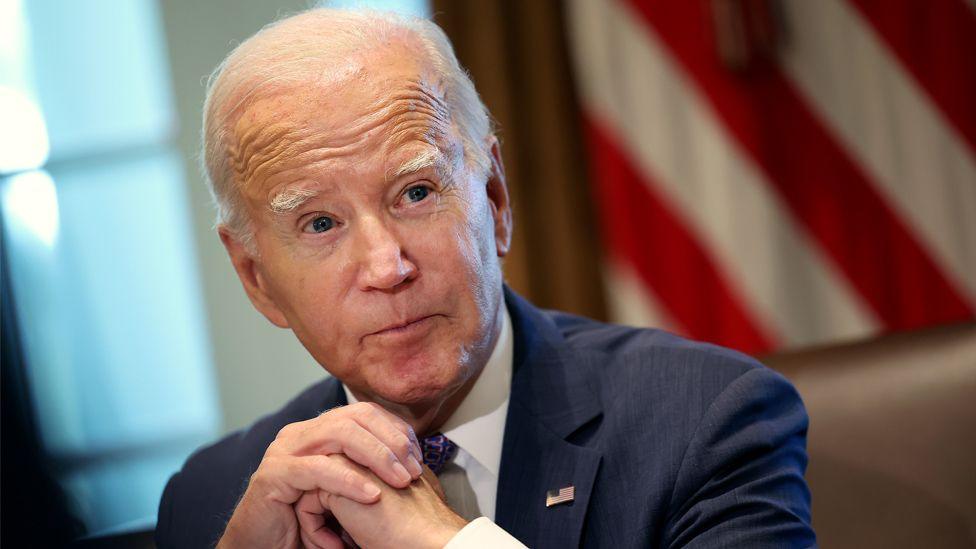Can Biden be replaced as nominee? Not so easily

- Published
Pressure is growing on Joe Biden to step aside after his poorly received performance in the first presidential debate against Donald Trump.
With November's election bearing down, a growing number of senior Democrats are speaking publicly or privately about their concerns.
The top two Democrats in the US Congress, Senate Majority Leader Chuck Schumer and House Minority Leader Hakeem Jeffries, have told him they fear he will be a drag on their members running for election.
More than 20 other lawmakers have publicly broken ranks, as have prominent supporters and party donors.
Mr Biden has in recent weeks defiantly vowed to stay in the race but now a Covid infection will sideline him for days.
Let's run through the possible scenarios.
Can Joe Biden withdraw?
Yes, if - and it's a big if - Mr Biden decides to step down as the Democratic Party's standard bearer, it would be relatively straightforward to find another candidate.
The party's nominee will officially be chosen at the Democratic National Convention (DNC) in Chicago from 19-22 August.
The Democrats are reportedly planning to nominate Mr Biden and Vice-President Kamala Harris virtually ahead of that gathering.
There, a candidate must win support from the majority of "delegates" - party officials who formally choose the nominee. Delegates are assigned to candidates proportionally based on the results of each state's primary election.
This year, Mr Biden won almost 99% of the nearly 4,000 delegates.
According to DNC rules, those delegates are "pledged" to support the incumbent president.
Biden 'not going anywhere' despite unclear moments in July 4 speech
If Mr Biden willingly drops out, it could turn into a free-for-all.
Democrats would be left with an open convention where they would suggest potential nominees and continue voting until one receives the majority of delegate votes.
That could spark a frantic contest among Democrats vying for a shot at the nomination.
Mr Biden has so far given no indication that he would consider stepping aside.
But if he decides to do so, "that opens up an entirely different can of worms", political historian Leah Wright Rigueur told BBC News.
"I think that if he were to get replaced, part of the negotiation for him stepping down would be that he would get the final say in who replaces him," she said.
Could he be forced out?
If he doesn't want to go, this is where the process gets really tricky.
In the modern political era, a major national party has never tried a hostile takeover of the nomination.
However, DNC regulations do have some loopholes that could, in theory, make it possible to push Mr Biden out.
The rules allow delegates to "in all good conscience reflect the sentiments of those who elected them", meaning they could look to someone else.
"It could be an incredibly ugly scenario," Ms Wright Rigueur said.
Experts told BBC News they doubt there would be a revolt among party delegates.
But the DNC can alter party rules at any point.
Ms Wright Rigueur pointed to 1968, when President Lyndon B Johnson decided not to run for re-election.
The party shifted from an open convention process, in which delegates could cast ballots for whomever they chose, to a bound process, where a delegate was attached to a candidate based on primary results.
Even if Mr Biden were suddenly to exit the race, conservative groups have vowed to file lawsuits challenging the legality of any replacement Democrat's eligibility for the ballot.

More on the election
Who could replace Biden as Democratic nominee?
- Published30 July 2024
Where Biden and Trump stand on key issues
- Published20 May 2024
Biden faces donor pressure as he digs in on re-election bid
- Published5 July 2024
'I feel terrible for him and America': Voters worry about Biden
- Published28 June 2024
Biden vows to fight on, rejecting calls to step aside
- Published29 June 2024
Biden blames jet lag and travel for poor debate performance
- Published3 July 2024

Will Kamala Harris replace Biden?
Vice-President Kamala Harris would automatically take Mr Biden's place if he were to step down during his presidential term.
But the same rules do not apply if Mr Biden pulls out as a candidate for November's election race, and there is no mechanism in place that would give the vice-president an upper hand at an open convention.
Instead, Ms Harris would have to win the majority of delegates, just like any other candidate.
It may be that Mr Biden backs her to replace him if he steps aside.
As she is already on the Democratic ticket, Ms Harris would have access to all the campaign funds currently available to the president. And she has a national profile.
But her relatively low popularity among the American public might dull that advantage.
Could the 25th Amendment be invoked?
The 25th Amendment of the Constitution allows the US vice-president and the majority of the cabinet to declare the president unable to perform the duties of office.
If invoked, power is transferred to the vice-president to serve as acting president.
This has never happened before.
But following the debate, senior congressional Republicans called on Mr Biden's cabinet to consider invoking this clause.
After the US Capitol riot in 2021, the Democratic-controlled House approved a resolution urging then-Vice President Mike Pence to invoke the 25th Amendment to oust Trump, but the move went nowhere.